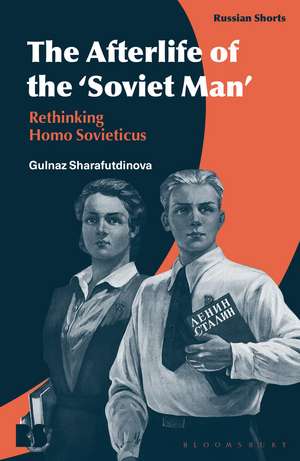The Afterlife of the ‘Soviet Man’: Rethinking Homo Sovieticus: Russian Shorts
Autor Dr Gulnaz Sharafutdinovaen Limba Engleză Paperback – 22 feb 2023
| Toate formatele și edițiile | Preț | Express |
|---|---|---|
| Paperback (1) | 85.90 lei 3-5 săpt. | +14.29 lei 6-12 zile |
| Bloomsbury Publishing – 22 feb 2023 | 85.90 lei 3-5 săpt. | +14.29 lei 6-12 zile |
| Hardback (1) | 316.61 lei 6-8 săpt. | |
| Bloomsbury Publishing – 22 feb 2023 | 316.61 lei 6-8 săpt. |
Preț: 85.90 lei
Preț vechi: 93.61 lei
-8% Nou
Puncte Express: 129
Preț estimativ în valută:
16.44€ • 17.58$ • 13.70£
16.44€ • 17.58$ • 13.70£
Carte disponibilă
Livrare economică 27 martie-10 aprilie
Livrare express 12-18 martie pentru 24.28 lei
Preluare comenzi: 021 569.72.76
Specificații
ISBN-13: 9781350167728
ISBN-10: 135016772X
Pagini: 136
Ilustrații: 10 bw illus
Dimensiuni: 129 x 198 x 12 mm
Greutate: 0.16 kg
Editura: Bloomsbury Publishing
Colecția Bloomsbury Academic
Seria Russian Shorts
Locul publicării:London, United Kingdom
ISBN-10: 135016772X
Pagini: 136
Ilustrații: 10 bw illus
Dimensiuni: 129 x 198 x 12 mm
Greutate: 0.16 kg
Editura: Bloomsbury Publishing
Colecția Bloomsbury Academic
Seria Russian Shorts
Locul publicării:London, United Kingdom
Caracteristici
Casts new light on contemporary Russian issues like the turn towards authoritarianism, the cult of Putin and the growth in Stalin nostalgia
Notă biografică
Gulnaz Sharafutdinova is Reader in Russian Politics at King's College London (King's Russia Institute), UK. She is the author of Political Consequences of Crony Capitalism Inside Russia (2011) and the co-editor, along with Neringa Klumbyte, of Soviet Society In The Era of Late Socialism, 1964-1985 (2012).
Cuprins
Prologue1. On Riding Bicycles and Human Judgement2. Homo Sovieticus as Eastern European Dissent3. Homo Sovieticus as Soviet Dissent4. Homo Sovieticus as a Perestroika Child 5. Homo Sovieticus as Post-Soviet Empathy6. Homo Post-Sovieticus as a Fight for the ContinentBibliographyIndex
Recenzii
A very timely book about major attempts to analyse Soviet-Russian identity before and after the collapse of the USSR. Combining methodological clarity with empathy and erudition, the author rejects a reductionist 'totalitarian' approach in favour of nuanced observation. A useful corrective to any current analysis of Russia, in peace and at war.















